Unit 4 Inventions Reading 课件(35张PPT,内嵌音频)
文档属性
| 名称 | Unit 4 Inventions Reading 课件(35张PPT,内嵌音频) | 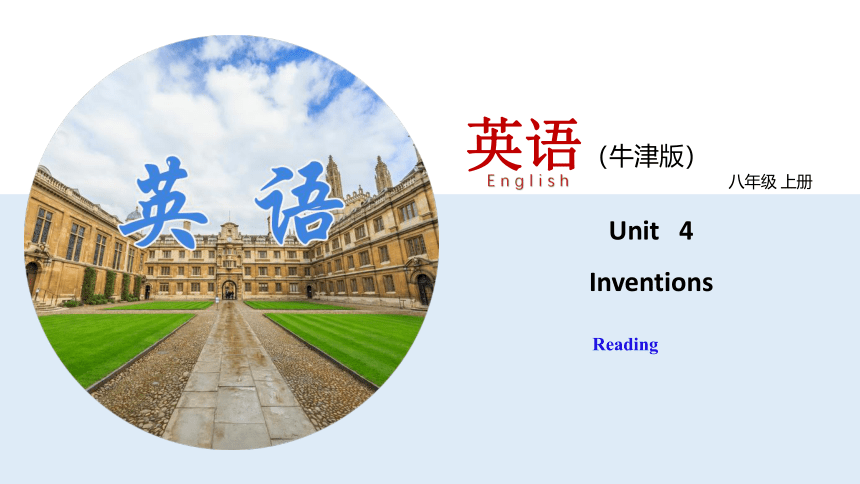 | |
| 格式 | pptx | ||
| 文件大小 | 19.6MB | ||
| 资源类型 | 教案 | ||
| 版本资源 | 牛津深圳版 | ||
| 科目 | 英语 | ||
| 更新时间 | 2023-06-04 15:53:29 | ||
图片预览

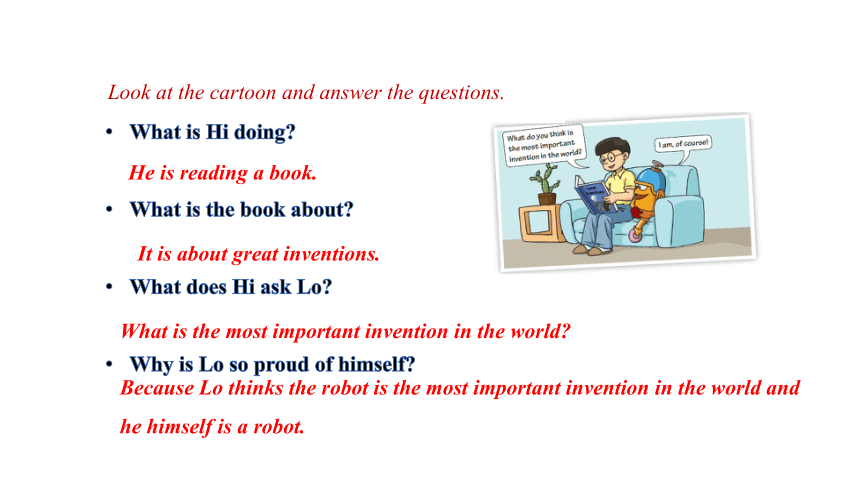
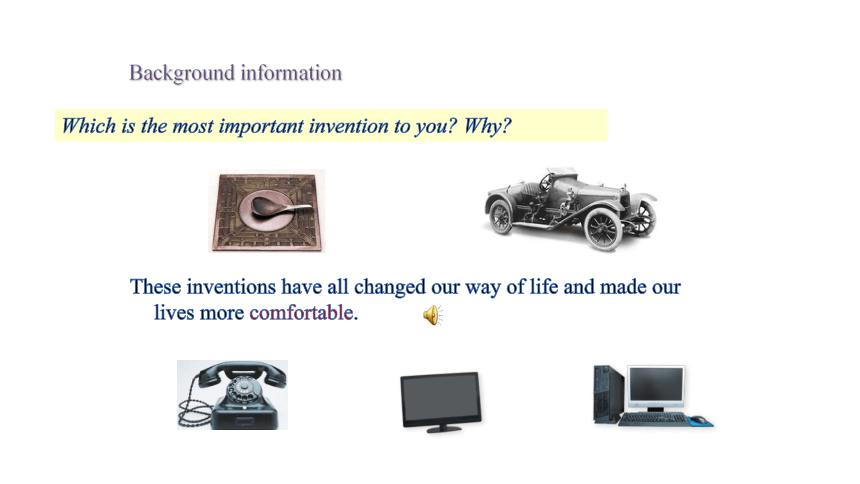
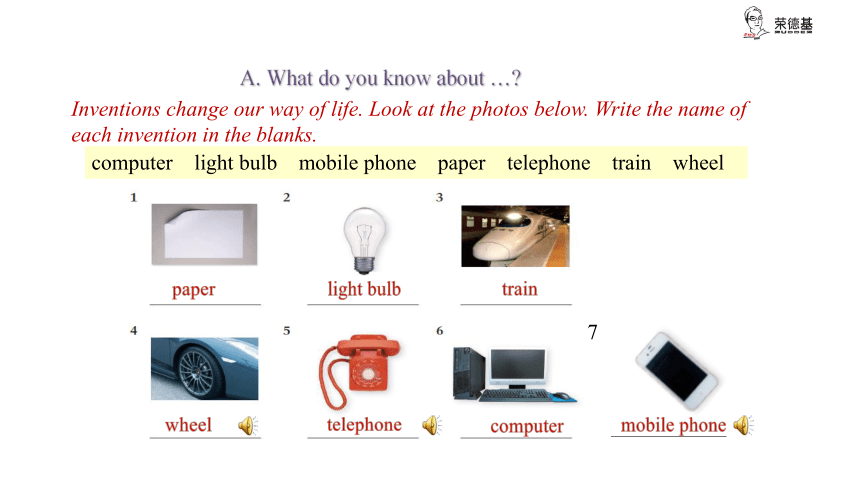

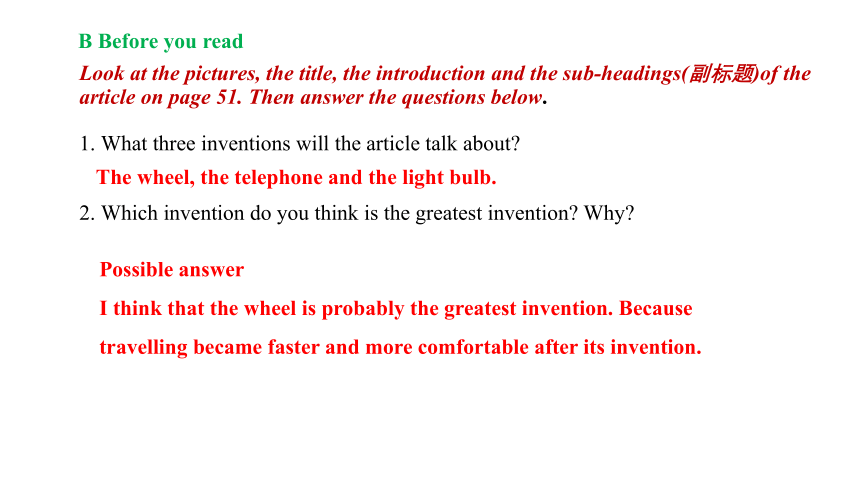
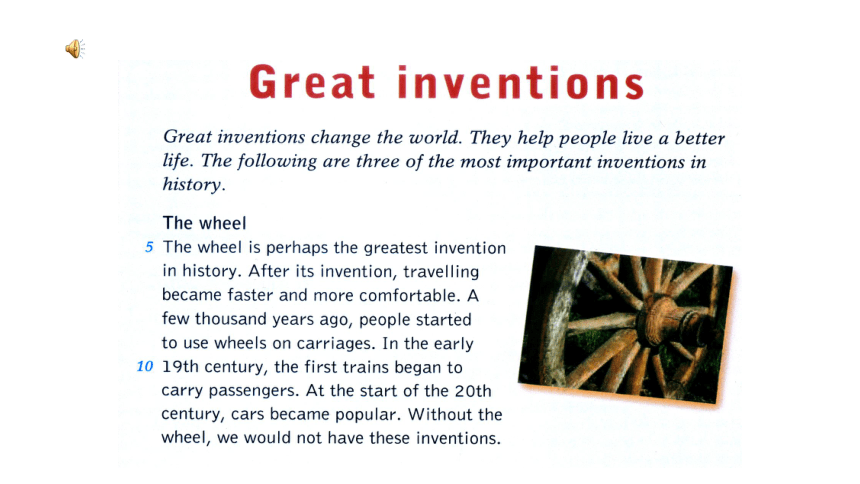
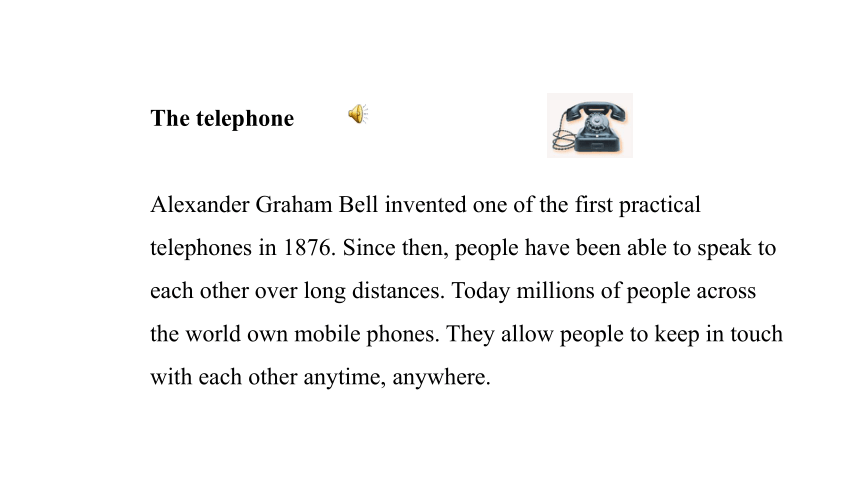
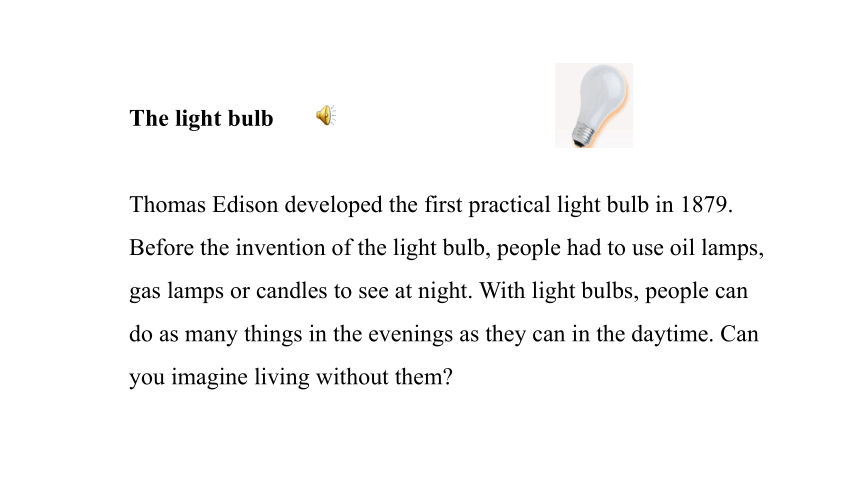
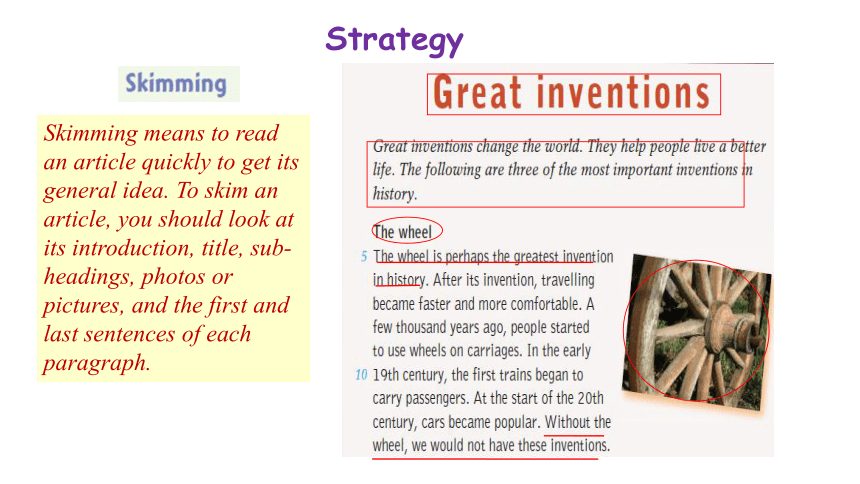

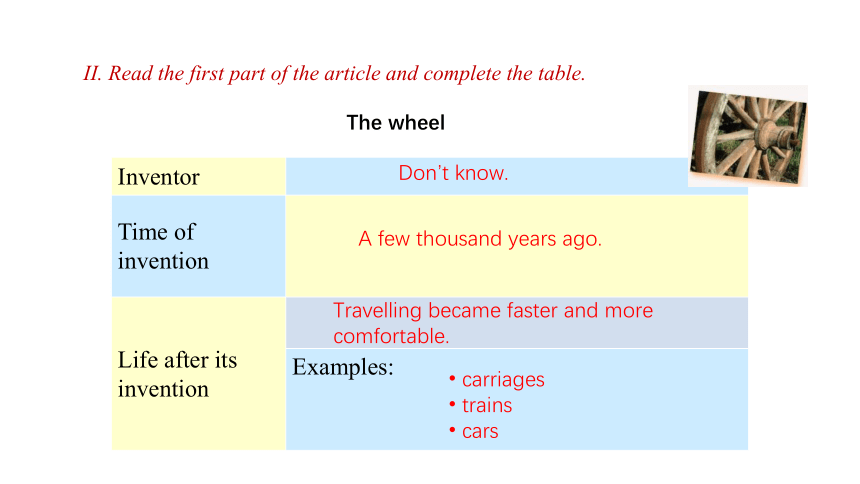
文档简介
(共35张PPT)
英语(牛津版)
八年级 上册
Unit 4
Inventions
English
Reading
What is Hi doing
What is the book about
What does Hi ask Lo
Why is Lo so proud of himself
Look at the cartoon and answer the questions.
He is reading a book.
It is about great inventions.
What is the most important invention in the world
Because Lo thinks the robot is the most important invention in the world and he himself is a robot.
These inventions have all changed our way of life and made our lives more comfortable.
Background information
Which is the most important invention to you Why
A. What do you know about …
Inventions change our way of life. Look at the photos below. Write the name of each invention in the blanks.
train
wheel
light bulb
telephone
computer
paper
mobile phone
computer light bulb mobile phone paper telephone train wheel
7
A2 How do these inventions help us in our daily lives In groups, discuss this with your classmates.
These inventions help us in many ways in our daily lives. We may use them anytime, anywhere.
They are very practical.
7
Look at the pictures, the title, the introduction and the sub-headings(副标题)of the article on page 51. Then answer the questions below.
1. What three inventions will the article talk about
2. Which invention do you think is the greatest invention Why
B Before you read
The wheel, the telephone and the light bulb.
Possible answer
I think that the wheel is probably the greatest invention. Because travelling became faster and more comfortable after its invention.
The telephone
Alexander Graham Bell invented one of the first practical telephones in 1876. Since then, people have been able to speak to each other over long distances. Today millions of people across the world own mobile phones. They allow people to keep in touch with each other anytime, anywhere.
The light bulb
Thomas Edison developed the first practical light bulb in 1879. Before the invention of the light bulb, people had to use oil lamps, gas lamps or candles to see at night. With light bulbs, people can do as many things in the evenings as they can in the daytime. Can you imagine living without them
Skimming means to read an article quickly to get its general idea. To skim an article, you should look at its introduction, title, sub-headings, photos or pictures, and the first and last sentences of each paragraph.
Strategy
Which invention is probably the greatest in history according to the article
When was the first practical light bulb invented
3 What did Alexander Graham Bell invent
1 How do great inventions help people
The wheel.
He invented one of the first practical telephones.
In 1879.
They help people live a better life.
I. Skim the article again and answer the following questions.
Inventor
Time of invention
Life after its invention
Examples:
The wheel
II. Read the first part of the article and complete the table.
Don’t know.
A few thousand years ago.
Travelling became faster and more comfortable.
carriages
trains
cars
Inventor
Time of invention
Life after its invention People can
People can
The telephone
speak to each other over long distances.
keep in touch with
each other anytime, anywhere with mobile phones
III. Read the second part of the article and complete the table.
Alexander Graham Bell.
In 1876.
IV. Read the third part of the article and answer these questions.
The light bulb
1 What did people use to see at night before the invention of the light bulb
People used oil lamps, gas lamps or candles.
2 What has life been like after the invention of the light bulb
People can do as many things in the evenings as they can in the daytime.
Vocabulary
C1 Find words from the article on page 51 that have similar meanings to the words in italics below.
1. My new shoes felt nice and soft. (line 7)
2. This modern city was only a small village a hundred years ago. (line 10)
3. All the people on the bus got excited when they arrived at the Great Wall. (line 11)
4. The company produced a new camera last year. (line 24)
5. The swimming pool is open during the day. (line 29)
comfortable
century
passenger
developed
daytime
C2 Complete the conversation below with the words from the box.
Change their forms if necessary.
Bill: When did people first start using cars
Maggie: People developed the first cars in the 1880s, and they started using
cars a lot in the early 20th(1)_________.
Bill: I’m sure the people were very happy because cars are so fast and
(2)___________.
Maggie: Not really. These early cars were very slow. They also created a lot
of problems.
century
comfortable
Bill: What do you mean
Maggie: Most people still had horses then, and the new cars made loud
noises and frightened them. Also, (3)___________ often got
very dirty after a long ride, so many people didn’t use them.
Bill: I suppose that people could only drive in the (4)________
because those cars didn’t have lights.
Maggie: That’s not true. They had lights, so people could drive them
(5)________.
passengers
daytime
anytime
Skimming
Skimming means to read an article quickly to get its main general idea.
To skim an article, you should look at its introduction, title, sub-headings, photos or pictures, and the first and the last sentences of each paragraph.
Comprehension
D1 Read the article on page 51 and complete the table below.
Alexander
Thomas
more
Edison
speak
do as
faster and
to each other
many things in the evenings
Graham Bell
over long
comfortable
distances
1. Which of the three things was invented first
_______________________________________
2. What inventions did the wheel make possible ________________________________________________
D2 Read again and answer the questions.
The wheel was invented first.
It made the inventions of carriages, trains and cars possible.
3. How do mobile phones help people keep in touch with each other
_____________________________________________________
4. How did people see at night before the invention of the light bulb ____________________________________________________
They had to use oil lamps, gas lamps or candles to see at night.
They allow people to keep in touch with each other anytime, anywhere.
telephone
wheel
comfortable
carriage
century
passenger
invent
n. 电话;电话机 p.50
n. 车轮;轮子 p.50
adj. 使人舒服的;舒适的 p.51
n. (旧时载客的)四轮马车 p.51
n. 世纪 p.51
n. 乘客;旅客 p.51
v. 发明;创造 p.51
advertisement
funny
create
n. 广告 p.49
adj. 滑稽的;好笑的 p.49
v. 创造;创作 p.49
本单元生词及短语
practical
since
distance
mobile phone
anytime
develop
lamp
candle
daytime
adj. 有用的;适用的 p.51
prep. 从…以后;自…以来 p.51
n. 距离;间距 p.51
n. 移动电话;手机 p.51
adv. 在任何时候;随便什么时候 p.51
v. 开发;研制 p.51
n. 灯 p.51
n. 蜡烛 p.51
n. 白天;日间 p.51
since then
keep in touch with
in the daytime
*live a better life
*in history
*in the early 19th century
*at the start of
*each other
*millions of
*across the world
*allow sb to do sth
*make loud noises
自那以来 p.51
与……保持联系 p.51
在白天 p.51
过更好的生活
在历史上
19世纪初
在……开始的时候
互相;彼此
大量的;数以百万计的
世界各地
允许某人做某事
制造很大的噪音
1. funny adj. 滑稽的;好笑的
fun n. 乐趣 have great fun =enjoy oneself 过得愉快,开心
我的老师喜欢讲那些很好笑的笑话。My teacher likes to tell some funny jokes.
我们在沙滩上玩的很开心。 We have great fun on the beach.
2. create v. 创造;创作
creation n. 创作,作品 creative adj. 有创造力的
在这部电影里,他创造了一个很有趣的人。
He created a very funny man in this film.
你相信上帝创造世界的说法吗?Do you believe that God created the world
3. The following are three of the most important inventions in history.
下面是历史上最重要的发明中的三项。
(1) following 在本句中作名词, 要与定冠词the连用 ,意为“下列;下述”,单复数同形。其作主语时,如果指单数或不可数名词,谓语动词用单数形式;如果指复数,谓语动词则用复数形式。例如:
全文如下。 The following is the full text.
以下是纽约的一些名胜。The following are some places of interest in New York.
following 也可作形容词使用,意为“接着的;下列的” 与定冠词the 连用,修饰后面的名词。例如:
第二年,他加入了共产党。
The following year, he joined the Communist Party.
你能回答下列问题吗? Can you answer the following questions
4. In the early 19th century, the first trains began to carry passengers.
在十九世纪初期,首批火车开始搭载乘客。
(1) century n. 世纪
in the early 19th century 19世纪初
in the mid-19th century/in the middle of the 19th century 19世纪中叶
at the end of the 19th century 19世纪末
在21世纪,人们 用电脑很多。In the 21st century , people use computers a lot .
(2) 序数词后面一般接单数名词表示次序,但本句中的the first trains 是“the+序数词+复数名词”的结构,表示“第……批……”,此时是把复数名词看作一个整体。例如:
第一批学生;首批学生 the first students 第二批学生 the second students
5. Alexander Graham Bell invented one of the first practical telephones in 1876.
亚历山大·格拉汉姆·贝尔在1876年发明了 第一个实用的电话。
(1) invent v. 发明;创造
inventor 发明者,发明家 invention 发明
他喜欢发明生活中的有用的东西。He likes inventing lots of useful things in daily life.
爱迪生是一个世界上伟大的发明家 。Edison was a great inventor in the world.
电视机的发明使我们的生活丰富了很多。
The invention of TV set makes our life more colourful.
(2) practical adj. 有用的;适用的
这机器很实用。 它可以帮我们多很多事情。
This machine is very practical. It can help us do lots of things.
6. Since then, people have been able to speak to each other over long distances.
自那以后,人们可以进行远距离通话了。
(1) since prep. 从……以后;自……以来
since then 自那以后since then在句中作时间状语。句子中如果有
since then作状语时,句子的谓语动词一般要用现在完成时,即“have / has + 动词的过去分词”,表示那时所做的动作对现在还有影响。例如:
自那以后,他发明了五件有用的东西。
Since then, he has invented five useful things.
(2) distance n. 距离;间距 in the distance 在远处
飞机能在很短的时间内飞很长的距离。
Planes can cover a long distance in a short time.
7. Today millions of people across the world own mobile phones.
今天,遍及世界各地,数以万计的人有自 己的手机。
(1) millions of 大量的;数以百万计的
(2) across the world 世界各地
(3) mobile phone n. 移动电话;手机
用手机打电话是很方便的。
It is very convenient for us to make a call with mobile phone.
8. They allow people to keep in touch with each other anytime, anywhere.
(1) allow sb to do sth 允许某人做某事
(2) keep in touch with 与……保持联系
当你不在家的时候要与家里保持联系。
Keep in touch with family when you are away from home.
我如何与你保持联系呢?How can I keep in touch with you
(3) anytime adv. 在任何时候;随便什么时候
你随时都可以来这里的。 You can come here anytime you like.
随便你什么时候来拜访我们都欢迎。You are welcome to visit us anytime.
9. ... and the new cars made loud noises and frightened them. ……(P52)
这些新汽车发出很大的噪音,让他们感到 害怕。
(1) make loud noises 制造很大的噪音
(2) frighten 是动词,意为“使惊恐;使害怕”,后面常接名词或代词。例如:
突如其来的噪音吓了我一跳。The sudden noise frightened me.
frighten 的形容词有两个:
frightened 受惊的;害怕的
常用来修饰表示人的名词常用句型有:
be frightened of ... 害怕…… be frightened to do ... 害怕做……
frightening 令人恐惧的;引起惊恐的
常用来修饰表示事物的名词。例如:
我怕狗。I am frightened of dogs.
那恐怖的声音是从那间旧房子传来的。The frightening voice was from the old house.
1,We have read an article about great inventions.
2, We have grasped the new words and expressions in the reading.
一、根据句意和所给首字母写出所缺单词。
1. Cai Lun i______ paper around 2,000 years ago in China.
2. The cartoon was so f_____ that it made all of us laugh happily.
3. It’s said that God c_____ the heaven and the earth in the beginning.
4. Mark Twain is one of the most famous writers in the nineteenth c_____.
5. Jane has lived in Guangzhou s_____ she left the college.
nvented
unny
reated
entury
ince
二、根据句意和所给出的中文提示写出所缺单词。
1. ______________(广告) give us information about products.
2. Though our house is very small, it is ______________(舒服的).
3. I don’t think it is a good idea. It doesn’t sound _________(适用的).
4. The bus is full of ___________(乘客).
5. In the past, people usually used _______(蜡烛) to light up the house.
Advertisements
comfortable
practical
passengers
candles
三、选择正确的答案。
( ) 1. ____ the Sun, nothing would grow.
A. With B. Without C. Under D. In
( ) 2. He hurried down to help us ____ across the river.
A. get B. to getting C. getting D. got
( ) 3. There was a big Moon and ____ stars were shining overhead.
A. hundred B. hundred of C. one hundreds of D. hundreds of
( ) 4. There’s only one seat so you’ll ____ sit on my lap.
A. must B. have to C. need D. may
( ) 5. Since then, Michael ____ an unhappy life.
A. live B. lives C. lived D. has lived
B
A
D
B
D
英语(牛津版)
八年级 上册
Unit 4
Inventions
English
Reading
What is Hi doing
What is the book about
What does Hi ask Lo
Why is Lo so proud of himself
Look at the cartoon and answer the questions.
He is reading a book.
It is about great inventions.
What is the most important invention in the world
Because Lo thinks the robot is the most important invention in the world and he himself is a robot.
These inventions have all changed our way of life and made our lives more comfortable.
Background information
Which is the most important invention to you Why
A. What do you know about …
Inventions change our way of life. Look at the photos below. Write the name of each invention in the blanks.
train
wheel
light bulb
telephone
computer
paper
mobile phone
computer light bulb mobile phone paper telephone train wheel
7
A2 How do these inventions help us in our daily lives In groups, discuss this with your classmates.
These inventions help us in many ways in our daily lives. We may use them anytime, anywhere.
They are very practical.
7
Look at the pictures, the title, the introduction and the sub-headings(副标题)of the article on page 51. Then answer the questions below.
1. What three inventions will the article talk about
2. Which invention do you think is the greatest invention Why
B Before you read
The wheel, the telephone and the light bulb.
Possible answer
I think that the wheel is probably the greatest invention. Because travelling became faster and more comfortable after its invention.
The telephone
Alexander Graham Bell invented one of the first practical telephones in 1876. Since then, people have been able to speak to each other over long distances. Today millions of people across the world own mobile phones. They allow people to keep in touch with each other anytime, anywhere.
The light bulb
Thomas Edison developed the first practical light bulb in 1879. Before the invention of the light bulb, people had to use oil lamps, gas lamps or candles to see at night. With light bulbs, people can do as many things in the evenings as they can in the daytime. Can you imagine living without them
Skimming means to read an article quickly to get its general idea. To skim an article, you should look at its introduction, title, sub-headings, photos or pictures, and the first and last sentences of each paragraph.
Strategy
Which invention is probably the greatest in history according to the article
When was the first practical light bulb invented
3 What did Alexander Graham Bell invent
1 How do great inventions help people
The wheel.
He invented one of the first practical telephones.
In 1879.
They help people live a better life.
I. Skim the article again and answer the following questions.
Inventor
Time of invention
Life after its invention
Examples:
The wheel
II. Read the first part of the article and complete the table.
Don’t know.
A few thousand years ago.
Travelling became faster and more comfortable.
carriages
trains
cars
Inventor
Time of invention
Life after its invention People can
People can
The telephone
speak to each other over long distances.
keep in touch with
each other anytime, anywhere with mobile phones
III. Read the second part of the article and complete the table.
Alexander Graham Bell.
In 1876.
IV. Read the third part of the article and answer these questions.
The light bulb
1 What did people use to see at night before the invention of the light bulb
People used oil lamps, gas lamps or candles.
2 What has life been like after the invention of the light bulb
People can do as many things in the evenings as they can in the daytime.
Vocabulary
C1 Find words from the article on page 51 that have similar meanings to the words in italics below.
1. My new shoes felt nice and soft. (line 7)
2. This modern city was only a small village a hundred years ago. (line 10)
3. All the people on the bus got excited when they arrived at the Great Wall. (line 11)
4. The company produced a new camera last year. (line 24)
5. The swimming pool is open during the day. (line 29)
comfortable
century
passenger
developed
daytime
C2 Complete the conversation below with the words from the box.
Change their forms if necessary.
Bill: When did people first start using cars
Maggie: People developed the first cars in the 1880s, and they started using
cars a lot in the early 20th(1)_________.
Bill: I’m sure the people were very happy because cars are so fast and
(2)___________.
Maggie: Not really. These early cars were very slow. They also created a lot
of problems.
century
comfortable
Bill: What do you mean
Maggie: Most people still had horses then, and the new cars made loud
noises and frightened them. Also, (3)___________ often got
very dirty after a long ride, so many people didn’t use them.
Bill: I suppose that people could only drive in the (4)________
because those cars didn’t have lights.
Maggie: That’s not true. They had lights, so people could drive them
(5)________.
passengers
daytime
anytime
Skimming
Skimming means to read an article quickly to get its main general idea.
To skim an article, you should look at its introduction, title, sub-headings, photos or pictures, and the first and the last sentences of each paragraph.
Comprehension
D1 Read the article on page 51 and complete the table below.
Alexander
Thomas
more
Edison
speak
do as
faster and
to each other
many things in the evenings
Graham Bell
over long
comfortable
distances
1. Which of the three things was invented first
_______________________________________
2. What inventions did the wheel make possible ________________________________________________
D2 Read again and answer the questions.
The wheel was invented first.
It made the inventions of carriages, trains and cars possible.
3. How do mobile phones help people keep in touch with each other
_____________________________________________________
4. How did people see at night before the invention of the light bulb ____________________________________________________
They had to use oil lamps, gas lamps or candles to see at night.
They allow people to keep in touch with each other anytime, anywhere.
telephone
wheel
comfortable
carriage
century
passenger
invent
n. 电话;电话机 p.50
n. 车轮;轮子 p.50
adj. 使人舒服的;舒适的 p.51
n. (旧时载客的)四轮马车 p.51
n. 世纪 p.51
n. 乘客;旅客 p.51
v. 发明;创造 p.51
advertisement
funny
create
n. 广告 p.49
adj. 滑稽的;好笑的 p.49
v. 创造;创作 p.49
本单元生词及短语
practical
since
distance
mobile phone
anytime
develop
lamp
candle
daytime
adj. 有用的;适用的 p.51
prep. 从…以后;自…以来 p.51
n. 距离;间距 p.51
n. 移动电话;手机 p.51
adv. 在任何时候;随便什么时候 p.51
v. 开发;研制 p.51
n. 灯 p.51
n. 蜡烛 p.51
n. 白天;日间 p.51
since then
keep in touch with
in the daytime
*live a better life
*in history
*in the early 19th century
*at the start of
*each other
*millions of
*across the world
*allow sb to do sth
*make loud noises
自那以来 p.51
与……保持联系 p.51
在白天 p.51
过更好的生活
在历史上
19世纪初
在……开始的时候
互相;彼此
大量的;数以百万计的
世界各地
允许某人做某事
制造很大的噪音
1. funny adj. 滑稽的;好笑的
fun n. 乐趣 have great fun =enjoy oneself 过得愉快,开心
我的老师喜欢讲那些很好笑的笑话。My teacher likes to tell some funny jokes.
我们在沙滩上玩的很开心。 We have great fun on the beach.
2. create v. 创造;创作
creation n. 创作,作品 creative adj. 有创造力的
在这部电影里,他创造了一个很有趣的人。
He created a very funny man in this film.
你相信上帝创造世界的说法吗?Do you believe that God created the world
3. The following are three of the most important inventions in history.
下面是历史上最重要的发明中的三项。
(1) following 在本句中作名词, 要与定冠词the连用 ,意为“下列;下述”,单复数同形。其作主语时,如果指单数或不可数名词,谓语动词用单数形式;如果指复数,谓语动词则用复数形式。例如:
全文如下。 The following is the full text.
以下是纽约的一些名胜。The following are some places of interest in New York.
following 也可作形容词使用,意为“接着的;下列的” 与定冠词the 连用,修饰后面的名词。例如:
第二年,他加入了共产党。
The following year, he joined the Communist Party.
你能回答下列问题吗? Can you answer the following questions
4. In the early 19th century, the first trains began to carry passengers.
在十九世纪初期,首批火车开始搭载乘客。
(1) century n. 世纪
in the early 19th century 19世纪初
in the mid-19th century/in the middle of the 19th century 19世纪中叶
at the end of the 19th century 19世纪末
在21世纪,人们 用电脑很多。In the 21st century , people use computers a lot .
(2) 序数词后面一般接单数名词表示次序,但本句中的the first trains 是“the+序数词+复数名词”的结构,表示“第……批……”,此时是把复数名词看作一个整体。例如:
第一批学生;首批学生 the first students 第二批学生 the second students
5. Alexander Graham Bell invented one of the first practical telephones in 1876.
亚历山大·格拉汉姆·贝尔在1876年发明了 第一个实用的电话。
(1) invent v. 发明;创造
inventor 发明者,发明家 invention 发明
他喜欢发明生活中的有用的东西。He likes inventing lots of useful things in daily life.
爱迪生是一个世界上伟大的发明家 。Edison was a great inventor in the world.
电视机的发明使我们的生活丰富了很多。
The invention of TV set makes our life more colourful.
(2) practical adj. 有用的;适用的
这机器很实用。 它可以帮我们多很多事情。
This machine is very practical. It can help us do lots of things.
6. Since then, people have been able to speak to each other over long distances.
自那以后,人们可以进行远距离通话了。
(1) since prep. 从……以后;自……以来
since then 自那以后since then在句中作时间状语。句子中如果有
since then作状语时,句子的谓语动词一般要用现在完成时,即“have / has + 动词的过去分词”,表示那时所做的动作对现在还有影响。例如:
自那以后,他发明了五件有用的东西。
Since then, he has invented five useful things.
(2) distance n. 距离;间距 in the distance 在远处
飞机能在很短的时间内飞很长的距离。
Planes can cover a long distance in a short time.
7. Today millions of people across the world own mobile phones.
今天,遍及世界各地,数以万计的人有自 己的手机。
(1) millions of 大量的;数以百万计的
(2) across the world 世界各地
(3) mobile phone n. 移动电话;手机
用手机打电话是很方便的。
It is very convenient for us to make a call with mobile phone.
8. They allow people to keep in touch with each other anytime, anywhere.
(1) allow sb to do sth 允许某人做某事
(2) keep in touch with 与……保持联系
当你不在家的时候要与家里保持联系。
Keep in touch with family when you are away from home.
我如何与你保持联系呢?How can I keep in touch with you
(3) anytime adv. 在任何时候;随便什么时候
你随时都可以来这里的。 You can come here anytime you like.
随便你什么时候来拜访我们都欢迎。You are welcome to visit us anytime.
9. ... and the new cars made loud noises and frightened them. ……(P52)
这些新汽车发出很大的噪音,让他们感到 害怕。
(1) make loud noises 制造很大的噪音
(2) frighten 是动词,意为“使惊恐;使害怕”,后面常接名词或代词。例如:
突如其来的噪音吓了我一跳。The sudden noise frightened me.
frighten 的形容词有两个:
frightened 受惊的;害怕的
常用来修饰表示人的名词常用句型有:
be frightened of ... 害怕…… be frightened to do ... 害怕做……
frightening 令人恐惧的;引起惊恐的
常用来修饰表示事物的名词。例如:
我怕狗。I am frightened of dogs.
那恐怖的声音是从那间旧房子传来的。The frightening voice was from the old house.
1,We have read an article about great inventions.
2, We have grasped the new words and expressions in the reading.
一、根据句意和所给首字母写出所缺单词。
1. Cai Lun i______ paper around 2,000 years ago in China.
2. The cartoon was so f_____ that it made all of us laugh happily.
3. It’s said that God c_____ the heaven and the earth in the beginning.
4. Mark Twain is one of the most famous writers in the nineteenth c_____.
5. Jane has lived in Guangzhou s_____ she left the college.
nvented
unny
reated
entury
ince
二、根据句意和所给出的中文提示写出所缺单词。
1. ______________(广告) give us information about products.
2. Though our house is very small, it is ______________(舒服的).
3. I don’t think it is a good idea. It doesn’t sound _________(适用的).
4. The bus is full of ___________(乘客).
5. In the past, people usually used _______(蜡烛) to light up the house.
Advertisements
comfortable
practical
passengers
candles
三、选择正确的答案。
( ) 1. ____ the Sun, nothing would grow.
A. With B. Without C. Under D. In
( ) 2. He hurried down to help us ____ across the river.
A. get B. to getting C. getting D. got
( ) 3. There was a big Moon and ____ stars were shining overhead.
A. hundred B. hundred of C. one hundreds of D. hundreds of
( ) 4. There’s only one seat so you’ll ____ sit on my lap.
A. must B. have to C. need D. may
( ) 5. Since then, Michael ____ an unhappy life.
A. live B. lives C. lived D. has lived
B
A
D
B
D
